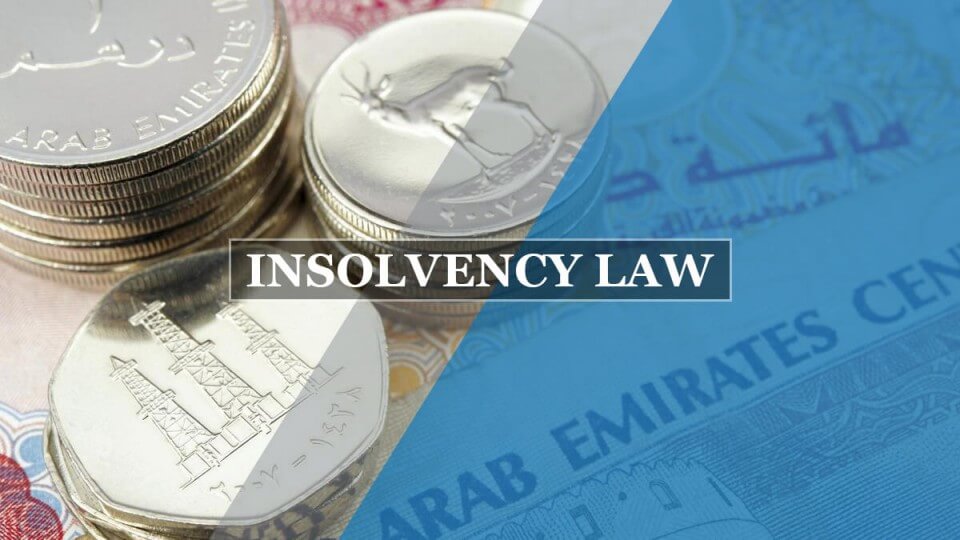Legal blog
Bankruptcy Law and Personal Insolvency Law

The UAE issued Insolvency Law No. 19 of 2019 on August 29, 2019, which directly deals with the insolvency of a natural person. The new law is a step taken by the government of the UAE to ensure convenience for citizens and expatriate residents and respond to their needs for managing their finances without facing any severe legal problems. The law will support individuals who are facing existing or anticipated financial difficulties, rendering them unable to settle their debts.
The new law will give an option to the citizens and residents to reschedule their debts and provide them with the opportunity to be granted new concessional loans if that may help them overcome their financial problems. The Federal Law by Decree No. (9) of 2016 on Bankruptcy that took effect in December 29th, 2016, issued by the President of United Arab Emirates, Sheikh Khalifa Bin Zayed Al Nahyan applies to companies established in accordance with the UAE Federal Law no. 2 of 2015 on Commercial Companies.
The new bankruptcy regime which deals with troubled companies about to collapse to have a way out and well-drafted guidelines and avoid such happening, especially for the companies which are in the market for more than a decade and have worked hard to make a reputation and name which they cannot afford to lose, maybe the solution to save their reputation and long-standing in the market.
Key Developments in the Bankruptcy Law
The new law expressly repeals the provisions of Chapter V (Termination of Bankruptcy) of the Commercial Transaction Law and The Federal law No. 3 of 1987 which governs the provisions of bankruptcy (Articles 417, 418, 419, 420, 421 and 422), and were abrogated by Article 230 of the new bankruptcy law. It has introduced several provisions that could aid to exercise the law more efficiently. As companies were previously obligated to file bankruptcy within the time-frame of 30 days from the date of default for the first payment, otherwise, they would be declared as “bankrupt by default” and criminal proceedings may be filed against the company’s representatives.
The new bankruptcy law has given the options to the shareholders and directors to choose between bankruptcy processes or to commence a preventive composition. This must be kept in consideration that new bankruptcy law is mainly applicable only to the commercial firms, wholly or partially government-owned companies formed under Emiri Decree by expressly mentioning that in their constitutional document, and individual traders.
However, the non-trader individuals will not be able to get any protection from the criminal prosecution and arrest under the law. This new law will not be of any benefit in the case of personal bounced cheque and will remain subject to the UAE Civil Code for recovery. One of the major issues that were being faced by the non-UAE nationals who are the directors and shareholders of UAE based companies in the past, was that they lived their lives under the fear of potential criminal liability under the Penal Code as being the signatory of a bounced cheque.
In accordance with the new law, if the protective composition or restructuring scheme has been initiated by the debtors, criminal breach of the law may be avoided. A list of insolvency experts and the register of insolvencies shall be maintained by the “Financial Restructuring Committee” who shall be applying certain tests to determine the liabilities of the company filing for bankruptcy such as “cash-flow” test and “balance sheet” test.
Directors, Shareholder and Possible Offences
There are a number of offences which may apply to directors and managers of companies which are later wound up by court order that falls within the provisions of Article 201 of the Bankruptcy Law. Any director who is found guilty of such offences and the people who undertake the management of the particular part of the business by the order of the board or the general manager shall be punishable by imprisonment of not more than two (2) years. Directors may also lead to personal financial liabilities, such offences may include:
1. Misuse of the payments for the ordinary course of business or approval for repayment to one or more particular creditors, this will constitute an offence if the preference was granted after the company ceased to pay its debts when they fell due.
2. When directors want to sell the company’s assets as low price and in bad faith will constitute an offence and shall be deemed as unlawful. Directors must keep this in mind that at the time of valuation of the assets, they obtain the current market value by obtaining the services of a professional valuation expert, particularly if the purpose of the sale is to delay the company entering either a preventive composition or bankruptcy.
3. The director will be held liable for conducting any other business activities other than major activities of the business as prescribed under the license of the business, particularly if such business activity is speculative in nature and has made a significant effect on the company’s financials.
4. It is important to note that offences just as fraudulent record-keeping, falsified accounting, deliberate concealment of facts and figures or any activity that may give an advantage over the distribution of the assets may also constitute a criminal offence.
Key Developments in the New Personal Insolvency Law
The new insolvency law mainly covers two key options and procedures for those facing financial difficulties in their personal finances. The first option available to an individual is by seeking court assistance to settle debts. The second option is to liquidate personal assets as a result of the inability of an individual to pay his debts for a period of time exceeding 50 days from the first default of payment.
During the liquidation proceedings, all legal actions including criminal proceedings against the bounced cheques issued by the debtor prior to the commencement of proceedings and judicial enforcement proceedings against the debtor and his assets will be deemed suspended with sole exception to the secured debts. In accordance with the new insolvency law, a debtor may seek courts assistance to settle the outstanding debt by appointing one or more expert but the appointment of an expert is subject to the approval of the court.
Where the court accepts the request for appointment of an expert, such action will put in place an effective moratorium on creditors actions to seize debtors' assets along with the creditor for commencing any sort of liquidation proceedings. In order to make a successful request for liquidation through courts, the debtor must be in default of payments to the creditor for more than 50 consecutive days.
The debtor must not conceal any of his assets from the court while making an application for liquidation and all statements made by the debtor regarding his assets, liabilities and rights must be true or else the application for liquidation may be rejected by the court. Upon approval of the proceedings through the appointment of court experts, a settlement plan must be put in front of the court, approved by creditors for voting.
The timeline of the settlement plan should not exceed 3 years from the date of the court’s approval, however, this timeline may be extended with the approval of creditor holding two-third or more of the unsettled debts. In case the creditor disapproves the plan or in not allowing the replacement of the security, the court may decide to terminate the proceedings, and that may result in immediate liquidation of the debtor as per the Law.
As a result of the liquidation, the debtor will be prohibited to apply for any new loans or finances for 3 years from the date of the insolvency judgement; and the debtor is restricted from entering into obligation, whether in return of consideration or not, for a period of 3 years from the date of the issued judgement. The debtor's rights as mentioned hereabove will be restored upon the completion of three years from the liquidation proceedings.
These restrictions may be reduced to two years where the debtor pays 50% of his outstanding debts and to one year where the debtor manages to pays 75% of his total outstanding debts. The aforementioned discussion implicates the major differences and points covered by two laws. We can assess that with this new development in bankruptcy regime, now companies have options through which bankruptcy may be avoided and you don’t have to run and leave all the hard-earned money and respect behind. Also for the individuals who are suffering through financial crisis have an option to make things more flexible and easy for them.
Written by
Khubaib Bin Naeem | Jassim Ali Al Haddad Lawyers & Legal Consultants

This publication is for general information purposes only. It does not purport to provide comprehensive full legal or other advice.
Legal Advice Middle East and the contributors accept no responsibility for losses that may arise from reliance upon information contained in this publication. This publication is intended to give an indication of legal issues upon which you may need advice.
Full legal advice should be taken in due course from a qualified professional when dealing with specific situations.
